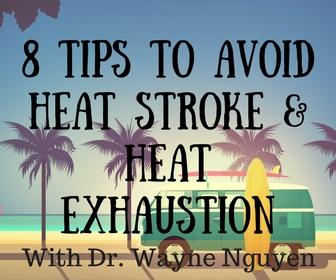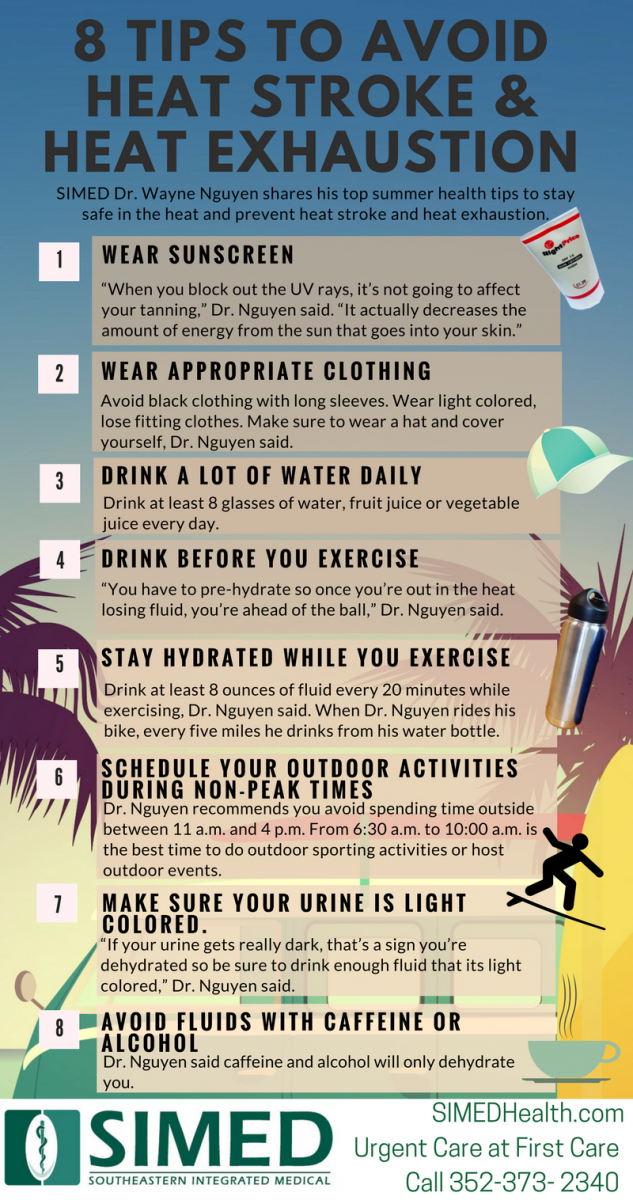
The summer sun can be intense in Florida, especially in Alachua County, Lake County and Marion County, and every year people are seen by Southeastern Integrated Medical (SIMED) physicians for heat-related symptoms.
Dr. Quang “Wayne” Nguyen, a practicing Physical Medicine and Rehabilitation and Interventional Pain Management physician at SIMED, said heat exhaustion and heat stroke are especially common in Florida during June, July and August.
“If people aren’t careful in the sun, it can be dangerous,” Dr. Nguyen said. “It’s not just high school football players who can get heat stroke. People should be especially careful with seniors and toddlers as their ability to regulate their body temperature is impaired.”
Heat Exhaustion vs. Heat Stroke
Heat exhaustion symptoms include dizziness, heavy sweating, fatigue, faster than usual heart rate or breathing rate, nausea, headache and vomiting. Heat exhaustion can eventually lead to heat stroke. The symptoms of heat stroke include a fever of at least 103 degrees, red hot dry skin, absence of sweating, throbbing headaches, confusion or changes in behavior.
Follow Dr. Nguyen’s top summer health tips to stay safe in the heat and prevent heat stroke and heat exhaustion:
1. Wear sunscreen.
You should wear sunscreen that’s at least SPF 30, Dr. Nguyen said.
“When you block out the UV rays, it’s not just going to affect your tanning,” Dr. Nguyen said. “It actually decreases the amount of energy from the sun that goes into your skin.”
2. Wear the appropriate clothing.
“Wear light colored, lose fitting clothes. Make sure to wear a hat and cover yourself,” Dr. Nguyen said. “Clothing with SPF ratings are ideal.”
3. Drink a lot of water daily.
“That’s really key,” Dr. Nguyen said. “Make sure to drink a lot of cool water.”
4. Drink at least 24 ounces of fluid in the two hours prior to outdoor activities or exercise.
“You have to pre-hydrate so once you’re out in the heat losing fluid, you’re ahead of the ball,” Dr. Nguyen said.
5. Stay hydrated while you exercise.
“Drink at least 6 - 8 ounces of fluid every 20 minutes while exercising,” Dr. Nguyen said.
When Dr. Nguyen rides his bike, every five miles he drinks from his water bottle.
“The key to preventing heat stroke is you never want to get thirsty,” he said. “You want to drink before you’re thirsty.”
6. Schedule Your Outdoor Activities During Non-Peak Times.
Dr. Nguyen recommends you avoid spending time outside between 11 a.m. and 4 p.m. From 6:30 a.m. to 10:00 a.m. is the best time to do outdoor sporting activities or host outdoor events.
“Once it hits 11:00 a.m. in Florida, it’s all downhill when it’s the middle of the summer,” Dr. Nguyen said.
7. Make sure your urine is light colored.
“If your urine gets dark, that’s a sign you’re dehydrated so be sure to drink enough fluid that its light colored,” Dr. Nguyen said.
8. Avoid fluids with caffeine or alcohol.
Dr. Nguyen said caffeine and alcohol will only further dehydrate you.
If you follow these tips, you should be able to stay out in the heat all day, Dr. Nguyen said, but if someone shows signs of heat exhaustion, make sure to get them into the air conditioning and drinking fluids. You can also put ice packs on their head, give them cool blankets and have them take a cool shower.
If you start to develop heat stroke symptoms, you should contact an urgent care facility like SIMED’s First Care in Gainesville at 4343 Newberry Road for treatment.
You can reach First Care at 352-373-2340 or walk in without an appointment between 7 a.m. and 6 p.m. Monday through Friday.
Dr. Nguyen sees patients with physical medicine, rehabilitation and interventional pain needs at SIMED’s Ocala and Lady Lake campuses. For an appointment in Ocala, call 352-732-3110, or in Lady Lake, call 352-732-0028 or request an appointment through SIMEDHealth.com.
